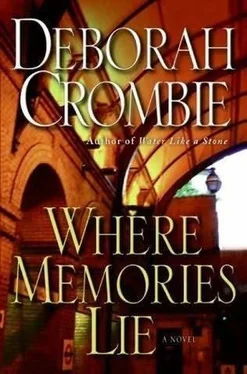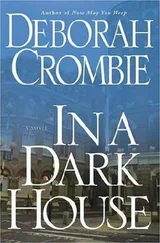"If I'm not mistaken, it's a mezuzah, a Jewish symbol of protection."
***
Even over the hum of conversation at the table, Kincaid heard the slight rise of alarm in Gemma's voice. Excusing himself with a smile at the other guests and a quick look at Cullen, who gave him a small nod, he slipped from his chair and threaded his way round the table and into the kitchen.
"We're in the midst of a dinner party, but I could come in the morning," he overheard as he came in. When he raised a brow in question, she covered the phone with her hand. "It's Erika. She says there's something she needs to talk to me about. But I-" She looked back at the dining room and shrugged.
Kincaid was surprised. He couldn't imagine the independent and elegantly mannered Erika Rosenthal calling so late with such a request unless something was wrong.
"Go," he said. "You've pulled the party off with flying colors, and things are winding down." He gestured towards the guests assembled in the dining room. "We'll tell them your friend's ill. And you'll get out of the washing-up."
"Lucky you." Gemma shot him a quick smile, then uncovered the phone. "Erika, I'll be there in a quarter of an hour."
***
The rain had stopped sometime during dinner, leaving the air fresh and cool. Realizing her head was a bit fuzzy from the wine she'd drunk, Gemma decided to walk the short distance to Arundel Gardens. It would give her a chance to clear out the high-energy chatter of the dinner party.
Just as a precaution, she took a brolly from the stand in the hall, and as she walked she swung it, tapping the end on the pavement. The leafy avenue of Lansdowne Road soon gave way to the terraces of Arundel Gardens, and light shone like a beacon from the lower windows of Erika's house.
It occurred to Gemma that she had never been to Erika's house in the evening, always for lunch or tea. She had always assumed Erika was early to bed and early to rise. She glanced at her watch as she rang the bell; it was half eleven.
Erika came quickly, however, and grasped Gemma's hands in an unexpectedly physical gesture. As she led Gemma into the sitting room, she said, "I shouldn't have got you out so late. You'll think I'm taking advantage of our friendship."
Gemma looked round with the pleasure she always felt. She had loved this room since the first time she had seen it, when, as a newly promoted inspector posted to Notting Hill, she had personally taken a burglary call, just to get the feel of the streets again. She had found Dr. Erika Rosenthal, a delicate white-haired woman with a fierce sparkle to her dark eyes, fuming over the theft of her television and some trinkets. It had been the invasion that had upset her more than the loss, and Gemma, worried about the older woman's vulnerability on her own, had suggested she improve her security. She had known that the recovery of the woman's possessions was highly unlikely.
She had stayed to chat a bit, she remembered, admiring the room with its deep red walls, expensive but comfortably worn furniture, shelves of books, and glowing landscape paintings. And then there had been Erika's grand piano, an object much envied by Gemma before Duncan had given her one of her own.
A few weeks later, embroiled in an odd case involving Duncan 's family in Glastonbury, Gemma had been researching goddess worship and had pulled up a monograph by Dr. Erika Rosenthal. Recognizing the name from their previous meeting, she had called on Erika for advice, and so had begun a rather unusual friendship.
They differed widely in age, education, and background, and yet Erika had given Gemma support and advice, and had taken a keen interest in the boys, particularly Kit, encouraging him to pursue his dream of becoming a biologist.
Now, Gemma wondered if she had given half as much to the relationship as she had taken. "Of course you're not taking advantage of me," she said crisply, glancing at the open book by Erika's chair, and a half-empty tumbler of what looked like whisky. She felt a frisson of unease-she'd never seen her friend drink anything stronger than the occasional sherry or glass of wine.
"Do let me get you something," Erika was saying, "for coming out at this hour. I've sherry or whisky, or I could make you tea."
"No, I'm fine, really." Gemma sat in her usual spot, the chair nearest Erika's, and studied her friend. "Just tell me what's wrong."
Erika subsided into her own seat and, after her burst of welcoming energy, seemed to shrink into herself. She looked frail and tired, and unnatural spots of color bloomed in her cheeks. Fingering the open book on her reading table, she said, "I feel foolish now, ringing you, when there's nothing…But it was such a shock, and I couldn't-"
The book slipped from her hands and landed, open, crumpled pages down, on the floor near Gemma's foot. Lifting it, she saw that it was not a book but an elegantly produced soft-cover catalog from the auction house Harrowby's. "'Art Deco Jewelry'?" she said aloud, reading the cover. "I don't understand."
"No, of course not." Erika shook her head, but made no attempt to retrieve the book. "And I hardly know where to begin."
Gemma sat quietly, making of her listening an almost physical thing, as she had learned to do in interviews.
After a few moments, Erika sighed and met her eyes briefly. "I don't often speak of these things. There are a few friends who know a little, because we share some experiences…but even so, after all these years, it is not easy." Her language began to slip into a more formal cadence, as if her native German were closer to the surface of her mind.
"You know I came here to London from Berlin, at the beginning of the war?"
"With your husband. Yes, you've told me that," agreed Gemma, realizing that she knew very little more.
"It sounds so simple, yes?" Erika's smile didn't reach her eyes, and her hands seemed to twist together of their own accord. "My father came to Germany from Russia," she continued, "after the Great War, thinking to make a new future for himself and his bride. So we are, you see, refugees by tradition, as are almost all Jews. His name was Jakob Goldshtein, and he was a tradesman with some skill in metalwork. He apprenticed himself to a jewelry maker, and by the beginning of the 1930s he had surpassed his late master and made a reputation for himself.
"He loved the new Art Deco styles, the influence of Egyptian and African art-he said it made him think of all the places he would never see. He loved the contrast of silver and platinum against the brightly colored stones, but above all, he loved diamonds. He was a jolly man, my father, who liked to make jokes about his name. It amused him that he only worked in silver metals.
"By the time the Nazis began their rise to power, my mother had died, and my father had acquired wealth as well as reputation. He took commissions from the new German elite, even if it meant adding hooks to his beautiful necklaces and brooches so that they could attach their swastikas." Erika's face had softened as she talked about her father, and there was no censure in her voice.
"He thought, of course, that it would pass, the new regime, as such things usually did. And so it was that he sent his spoiled only daughter to university, and there she fell in love with her tutor, and married."
Erika stopped, her hands still now, and silence descended upon the room. There were no muffled voices from the houses on either side, no footsteps from the street, and Gemma hesitated on the precipice of speech, not sure whether she might extend the spell or break it. At last she said, very softly, "This was your husband?" and as she spoke she realized how seldom she had heard Erika speak of her marriage.
"David, yes. He was fifteen years older than I, a philosopher, and a pacifist, quite well known in intellectual circles. There was even talk that he might be nominated for the Nobel Prize. But in 1938, Carl von Ossietzky died in police custody, and my father knew what David refused to see, that neither David nor his ideas would be tolerated.
Читать дальше












